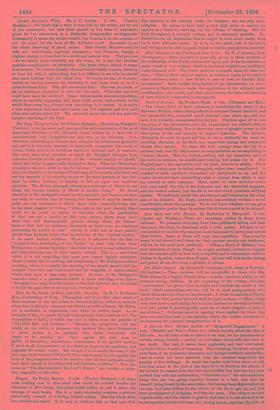The Deep Things of God. By William Bathgate. (Maclehose, Glasgow).
This book is for the most part an exposition and examination of the most important doctrines of the Christian creed, written by a man who is unmistakably both thoughtful and also free in his thinking. It is, therefore, interesting to observe how orthodox his conclusions generally are, and it is certainly unusual to meet with scepticism (the word, of course, being used in no invidious sense) so reverent and so cautious. The most important question on which Mr. Bathgate diverges from orthodox doctrine is the question of the "eternal sonship of Christ," which the writer is apparently inclined to deny. What his Christology actually is we have tried in vain to discover ; "the eternity, the person- ality, the divinity of the being of Christ may all be roundly admitted, and yet the eternity of his sonship as one of the three persons of the God- head be either doubted or denied, or left an open and insoluble question. The divine, personal, eternal pre-existence of Christ is one thing, the eternal sonship of Christ is another thing." We direct attention to Mr. Bathgate's views on this question, not because we have any wish to convict him of heresy, but because it may be useful to point out one conclusion to which those views naturally bring him. In the same chapter he writes, " Altho ugh in the past eternity there could be no point or period of duration when the personality of God was not a reality in His very nature, there must have been vast and immeasurable periods during which the Father- hood of God had no existence, inasmuch as there were no creatures possessing the nature of sons." Surely it could not be more plainly shown than by these words that the doctrine of the "eternal sonship" is no mere logical subtlety. When it is affirmed that the Son is ." begotten from everlasting of the Father," or that "the whole three Persons are co-eternal together," the truth involved is that fatherly love and filial obedience are in their nature eternal. This is a conviction which it is not surprising that some men cannot lightly surrender. There is much that is striking and stimulating in Mr. Bathgate's ethical teaching, which is evidently the teaching of one deeply moved with the thought "how rich and varied and vast the kingdom of righteousness within and upon a man may become." In some of Mr. Bathgate's remarks there is a quaintness which is quite startling, as in this,— " Eternity is BO long, that the variety of the wide universe may be needed so to fill the ages that ennui may not overtake us."






































 Previous page
Previous page